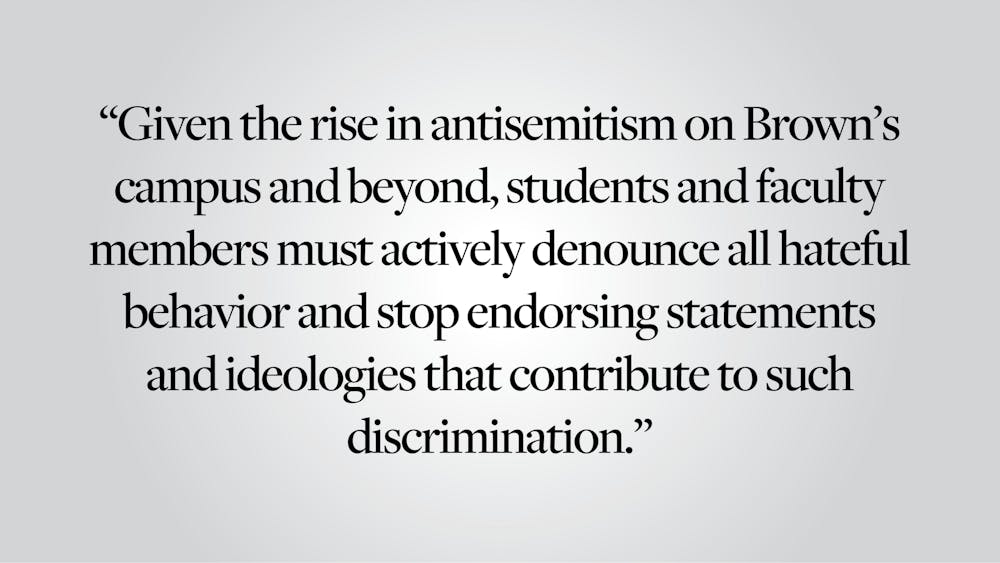The violent threats against the leaders of Brown-RISD Hillel have left the Jewish community sad, angry and disgusted. But even more troubling than the threats may be the absence of outrage from the campus community.
On the morning of Sunday, Feb. 12, the director and assistant director of Brown-RISD Hillel received violent threats in their emails. This was not, however, the first time Brown-RISD Hillel was subjected to vile threats. Over a year ago, someone left a sinister note in the Hillel lobby saying: “I would never give the rich stuck up entitled Jews any money. F—k you all. Hail [sic] Hitler. Gas the f—king Jews and hope you die.”
I wish I could say these instances were anomalies; however, in the wake of Oct. 7, just hours after a tragedy that saw innocent babies, men, women and children slaughtered and raped in broad daylight, Brown students made statements that challenged the very fabric of our moral compass and show a disturbing detachment from basic human values.
Weeks before any Israeli military response to the most devastating day for the Jewish people since the Holocaust, was there a note of sympathy toward Brown’s Israeli and Jewish community from student groups? No. Just days after this horrible bloodshed, Brown Students for Justice in Palestine justified the attacks, stating that “the Palestinian right to return and right to resist their elimination is not only just, but enshrined under international law.” Students labeled posters of kidnapped children as “Israeli Propaganda.” And rather than condemn the barbaric rapes that took place on Oct 7, Brown's Graduate Labor Organization deemed those reports “Zionist propaganda” and participated in a rally that called the New York Times report of rapes “tired, old, racist fantasies.”
Let me be clear: mass murder, rape, and the kidnapping of civilians is not resistance, it is barbaric terrorism. Justifying or denying the realities of such a massacre under any context is indefensible. This isn't about cultural, political or Western stances; it's about universal human decency, a principle that should know no borders or beliefs.
Given the response to Oct. 7, and the delegitimization of Jewish accusations of violence, it is no coincidence that violent threats were sent to the central hub of Jewish life at Brown. Celebrating violence and denigrating Jewish victims of sexual violence does nothing but normalize antisemitism. In fact, increases in forms of anti-Zionist activity, which has become a near constant at this point at Brown, are ultimately shown to lead to increases in antisemitism.
Can you imagine the rightful public outrage that would ensue if the head of the LGBTQ Center or Brown Center for Students of Color received such threats against them and their families? At the same time that antisemitism has skyrocketed across the globe, it has increasingly become normalized.
More than ever, there is a need for us to put aside political differences and recognize identity-based harms for what they are. Consider the example from 1997, when King Hussein of Jordan personally offered condolences to the families of Israeli girls killed by a Jordanian soldier, telling one of the mourning Israeli parents at the time, "Your daughter is like my daughter. Your loss is my loss." His actions transcended political and national lines, embodying a humane response to tragedy.
In responding to the antisemitic notes on campus, I am imploring two groups to act: faculty members and the broader, “silent” student body.
To professors: your role extends beyond your political positions. Whether you advocate for extreme positions on either side of the Israel-Palestinian conflict, one of your primary responsibilities is to educate and inspire future leaders. This responsibility includes teaching them to condemn violence and to foster an environment that encourages healthy debate and critical thinking. Your leadership, or lack thereof, shapes the future. If you promote an environment that enables hate and drives our community into further division, you have failed in your role as an educator.
To the wider Brown community: complacency is not an option. Misinformation, silence and cowardice, manifested in anonymous online posts or masked protestors, have severe consequences. True leadership, exemplified by figures like Mahatma Gandhi or Martin Luther King Jr., is characterized by openness and bravery. This is a moment to reflect critically on the information we consume and speak out against hate. Denying facts, such as the atrocities of Oct. 7, is akin to rejecting the historical truths of the Holocaust or the realities of COVID-19. Opinions are a personal right, but distorting facts and ignoring legitimate threats to safety undermines the very foundation of American society and the campus community.
It is our collective responsibility to work together to foster a community where safety, respect and collaborative problem-solving prevail — not to shout down anyone and everyone you disagree with. It is time to listen to all Jewish students, even the ones you disagree with politically, and learn about antisemitism and how it manifests today. Given the rise in antisemitism on Brown’s campus and beyond, students and faculty members must actively denounce all hateful behavior and stop endorsing statements and ideologies that contribute to such discrimination.
Only by truly learning rather than getting defensive, can we combat the rise in antisemitism taking place around the world today and on our campus. If we do so, we can make Brown a model for other institutions worldwide in addressing complex and sensitive issues.
Brooke Verschleiser can be reached at brooke_verschleiser@brown.edu. Please send responses to this op-ed to letters@browndailyherald.com and other op-eds to opinions@browndailyherald.com.





